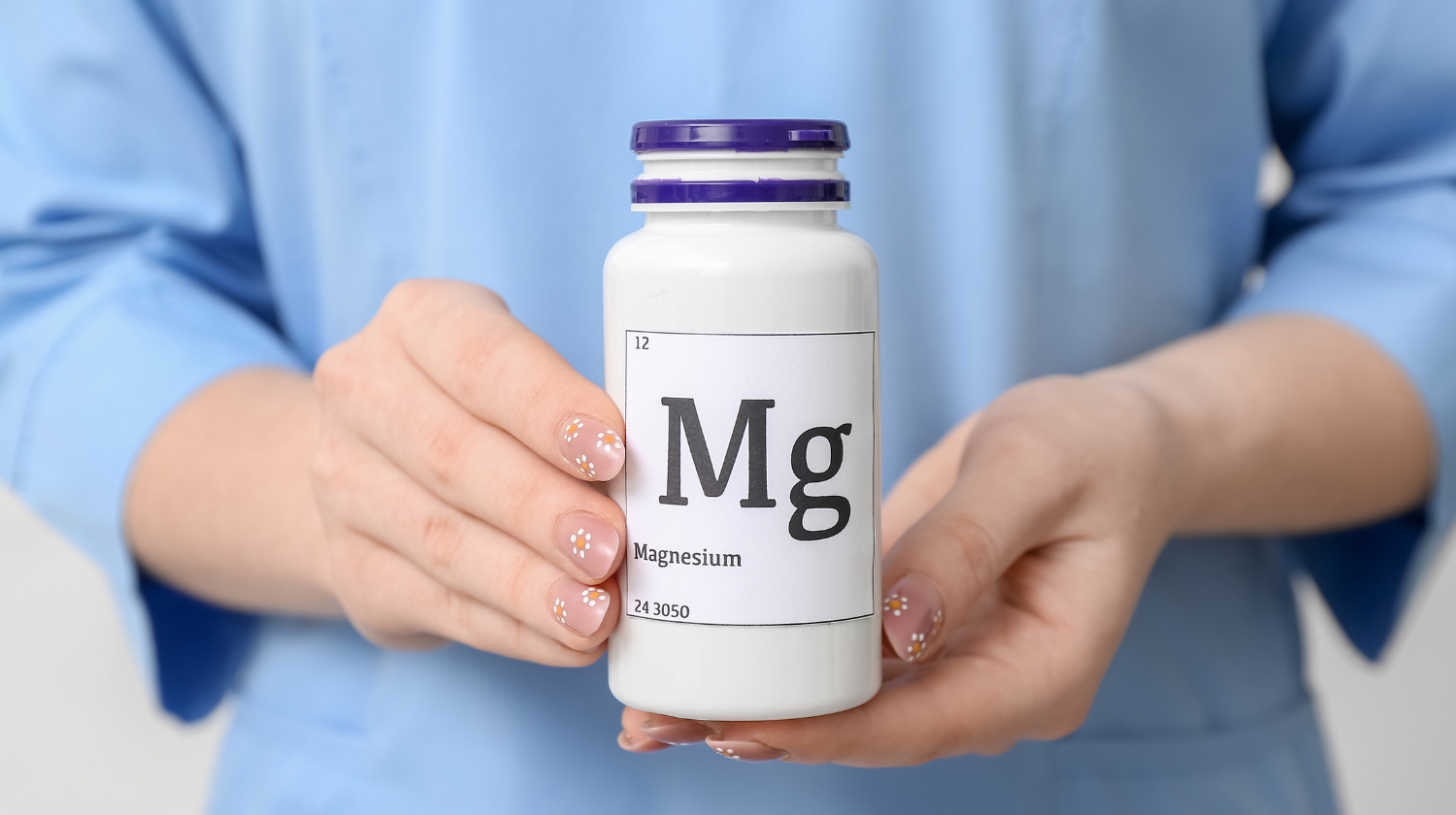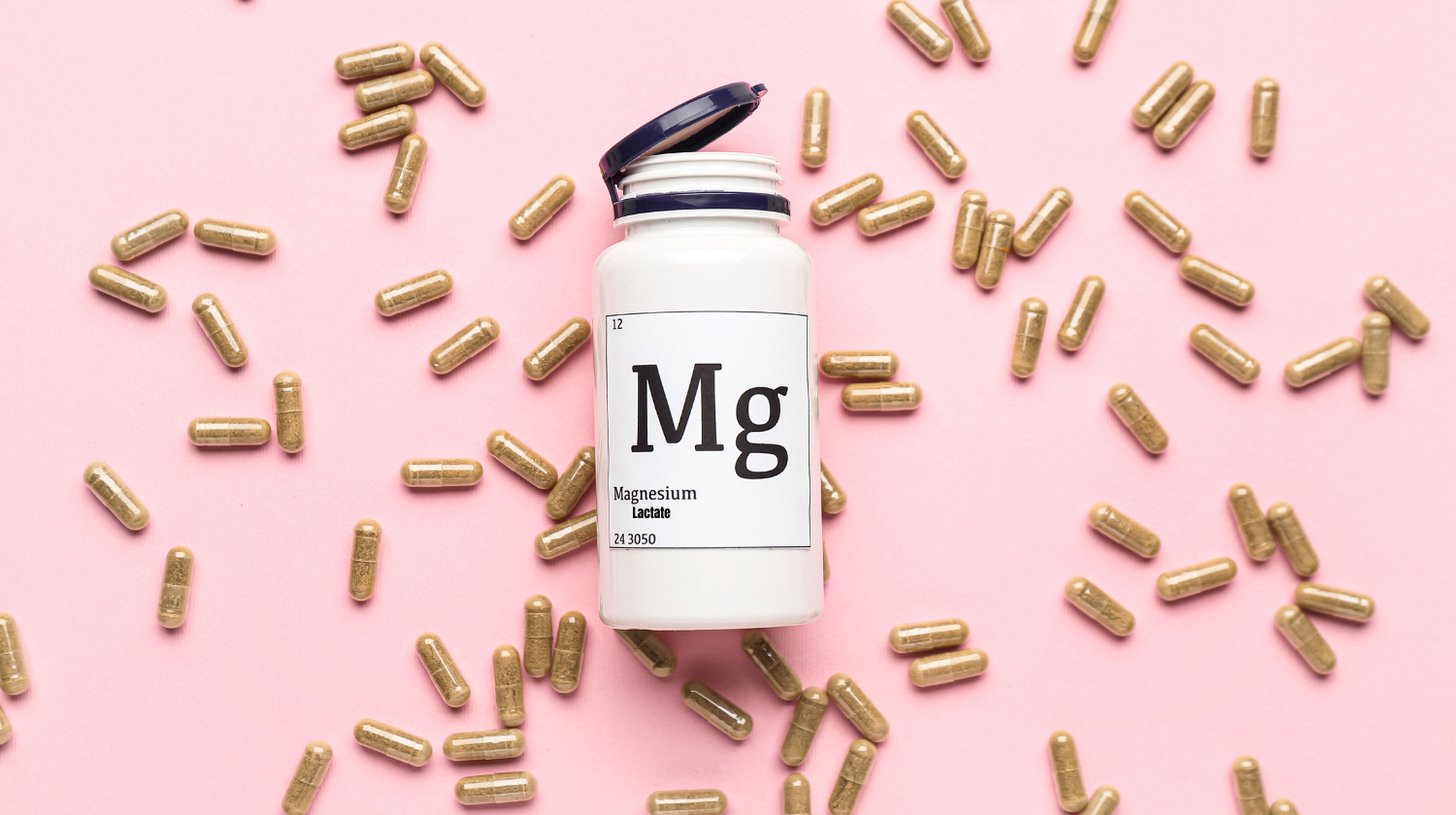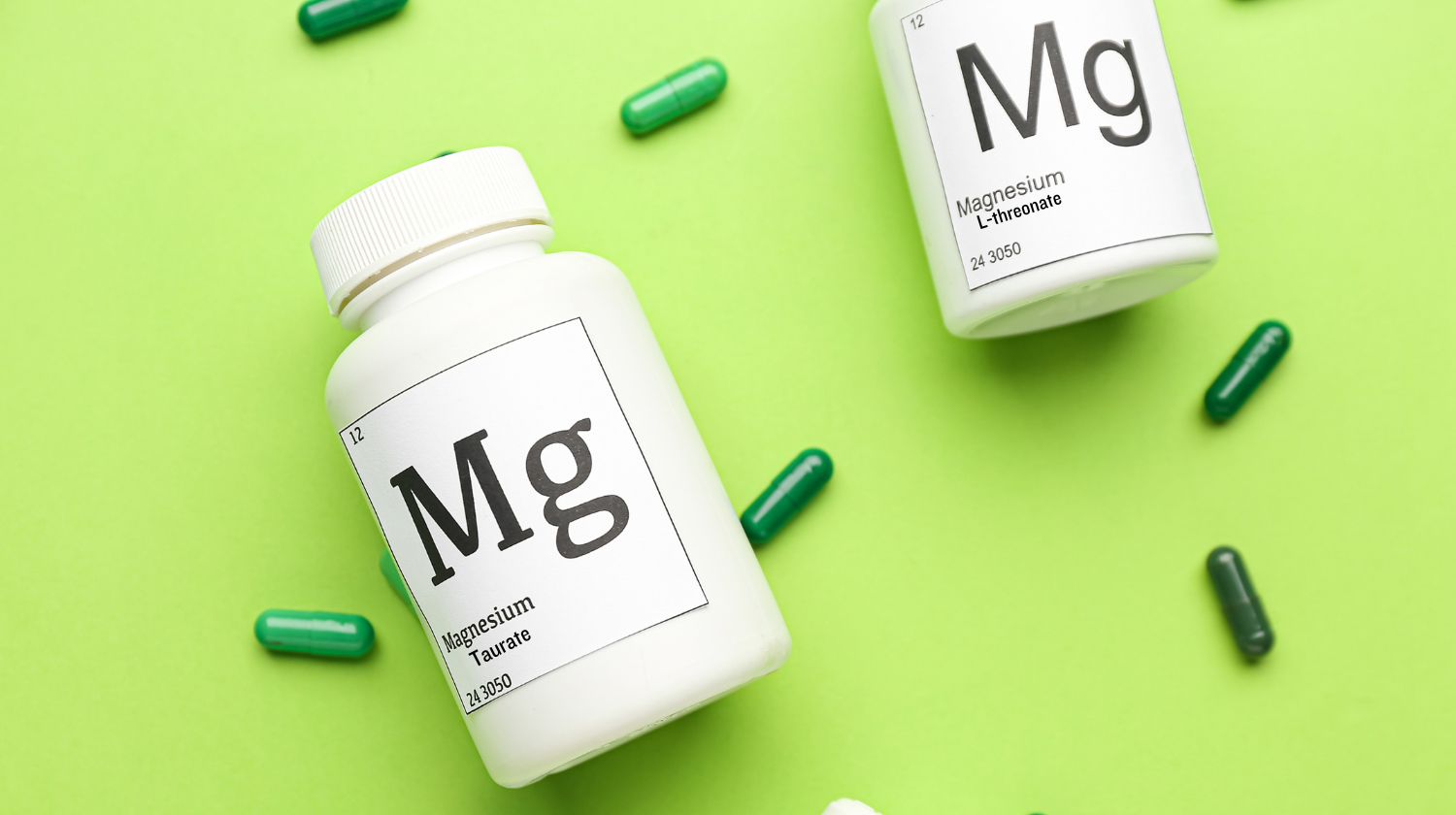Magnesium For Anxiety 2024: Does It Really Work?

According to the World Health Organization, over 300 million people worldwide[1] suffer from an anxiety disorder, making it one of the most common mental health disorders. Anxiety can cause overwhelming feelings of dread and panic and is often associated with physical symptoms like increased heart rate, shallow breathing, dizziness, lightheadedness, sleep disturbances, trembling, and gastrointestinal distress. Anxiety symptoms can become so severe that working, interacting with others, and accomplishing daily tasks become unmanageable.
There are effective treatments for nervous system disorders, such as anxiety psychotherapy and medications. However, medications for anxiety can cause significant side effects, and access to effective psychotherapy can be limited by location and resources. As research continues to demonstrate the ability of natural remedies to improve mental health, many are turning to magnesium for anxiety. Magnesium is an important micronutrient used by the body in many ways; relief from anxiety appears to be among the many benefits of magnesium.
Does Magnesium Help With Anxiety?
Yes, magnesium can help reduce anxiety symptoms. In addition to being critical for healthy bones, muscle contraction, and maintaining cardiac rhythm and blood flow, magnesium impacts several aspects of the nervous system, including brain functioning, the production of neurotransmitters, neural communication, regulation of the brain’s stress response system, and sleep. Studies have shown that magnesium deficiencies are associated with anxiety and that magnesium supplements are a promising natural remedy for this nervous system disorder.
What Is Magnesium?
Magnesium is a critical nutrient for the healthy functioning of the body and mind. This element plays a vital role in many body processes,[2] including insulin release, regulating blood pressure, muscle contraction, and maintaining a healthy heart rhythm. Magnesium is required for over 300 metabolic reactions that produce energy for the body and is a necessary component of proteins, DNA, bones, and neurotransmitters.
Eating magnesium-rich foods like legumes, nuts, seeds, whole grains, and leafy green vegetables, or fortified foods like cereals and some milk products can help you get the magnesium your body needs. Changes in farming practices and the increased availability of processed foods have prevented many from ingesting sufficient levels of this vital nutrient. Low levels of magnesium are now the norm, and the rate of sub-clinical magnesium deficiencies[3] among obese and non-obese in developed countries ranges from 27-29%, respectively, and approximately 50% of Americans consume less than the estimated average requirement for this nutrient.
How Does Magnesium Work In The Brain?
Magnesium is involved in several aspects of the brain’s response to stress. It helps regulate the activity of the hypothalamic-pituitary-adrenal axis, the brain’s stress response system that is overactivated in anxiety. Magnesium supplements dampen this overactivation, leading to lower levels of stress hormones[4] like cortisol in the blood. Chronic anxiety can lead to excessive release of excitatory neurotransmitters like glutamate and lower levels of neurotransmitters like gamma-amino butyric acid or GABA that help quiet the brain. Magnesium supplements may relieve symptoms of anxiety by helping to restore this balance,[5] although further studies are needed to confirm results.
Does magnesium help with anxiety? Yes. Can magnesium cause anxiety? While research has not conclusively demonstrated that magnesium deficiency induces anxiety, studies have shown a link between low magnesium and anxiety.[6] There is evidence that magnesium supplements can help improve symptoms of anxiety[7] without the side effects commonly associated with many anti-anxiety medications.
Studies Investigating Magnesium For Anxiety
An eight-week randomized controlled trial in people with low magnesium and high stress showed that magnesium supplementation was associated with significant improvements in anxiety and depression[4] and increases in quality of life. A systematic review of studies evaluating magnesium’s impact on anxiety reported that 50% of the studies reported positive effects of magnesium[5] on anxiety. However, this review highlighted the poor quality of most studies and noted that more research is needed, particularly research that does not rely solely on self-report data.
A study investigating the impact of magnesium on depression symptoms showed that six weeks of supplementation was associated with significant decreases in depression[8] and improvements in generalized anxiety disorder. Depression and anxiety often co-occur so it is likely that improvements in depression also reflect reductions in anxiety.
Sleep disruptions are a frustrating byproduct of anxiety. Research has shown that magnesium plays a critical role in regulating sleep. A systematic review of studies found that greater dietary intake of magnesium was associated with better sleep quality[9] in observational studies. Observational studies included in the review revealed that magnesium supplements positively impacted sleep health while the randomized control trials showed fewer associations between magnesium and sleep quality.
Types Of Magnesium And Their Effectiveness For Anxiety
If you are considering taking magnesium supplements, you have probably noticed the availability of several different forms of magnesium, including:
- Magnesium citrate: often used to treat constipation.
- Magnesium oxide: used to treat constipation, but not for raising magnesium levels as it is not readily absorbed by the body.
- Magnesium lactate: has demonstrated some effectiveness for reducing anxiety[4] in those who have low magnesium levels.
- Magnesium glycinate: typically used to treat gastrointestinal symptoms.
- Magnesium taurate: rapidly absorbed into the brain and decreases anxiety.[10]
- Magnesium L-threonate: has high absorption rates and can improve memory and cognition,[11] particularly among older consumers.
Which Magnesium Is Best For Anxiety?

Determining which type of magnesium is best for sleep and anxiety can be difficult due to the lack of well-designed randomized clinical trials. Systematic reviews frequently include studies using different forms of magnesium, which prohibits conclusions regarding which type is best for anxiety.
When evaluating supplements for mental health, the supplement’s ability to cross the blood-brain barrier is vital. Many supplements have good bioavailability within the digestive system and can circulate through the body in the bloodstream, but are prohibited from entering the brain by this protective barrier.
Based on current research, the best choices for reducing anxiety include:
- Magnesium lactate.
- Magnesium taurate.
- Magnesium L-threonate.
Magnesium Lactate

A carefully controlled, randomized eight-week trial showed that magnesium lactate effectively reduced anxiety and depression[4] in individuals who had low blood levels of this nutrient and increased quality of life. Additionally, magnesium lactate is routinely used in several of the studies examined by systematic reviews.
Magnesium Taurate And Magnesium L-threonate

Evidence from animal studies suggest that magnesium taurate and magnesium L-threonate can efficiently cross the blood-brain barrier and produce meaningful changes in the brain.
One study showed that magnesium taurate was absorbed quickly, and that, following magnesium intake, animals had high levels of this supplement in their brain tissue. Animals treated with this supplement also exhibited reductions in anxious behavior.[10] This evidence is exciting, but further research is necessary to determine the effectiveness of this supplement for humans.
When compared to other forms of magnesium (citrate, chloride, glycinate, and gluconate), a magnesium L-threonate supplement increased magnesium levels in the brain and neurons,[11] demonstrating its access to the brain. Additionally, improvements in memory and cognition were observed for healthy adults taking this supplement. Anxiety often causes problems with memory and concentration; future research should investigate the efficacy of magnesium L-threonate for anxiety in humans.
How Much Magnesium Should I Take For Anxiety?
The recommended daily intake of magnesium varies depending on your age and sex. The National Institutes of Health recommend a daily intake[12] of 400 to 420 milligrams for adult men and 310 to 320 milligrams for adult women. Some medical conditions like Crohn’s disease and chronic alcoholism can affect magnesium absorption, so people with these conditions may require supplemental magnesium.
The NIH recommends an upper limit of 350 milligrams for magnesium supplements. While research is yet to determine the ideal magnesium for anxiety dosage, most studies investigating magnesium for anxiety and sleep have used a dose of around 300 milligrams per day. How much magnesium to take for anxiety will depend on many factors, including your sex, age, current magnesium levels, and symptom severity.
Side Effects & Safety
Studies have shown that supplementation raises magnesium levels with minimal side effects. In healthy adults, excess magnesium will be excreted in the urine. However, ingestion of magnesium that far exceeds the upper limits recommended by the NIH can cause magnesium toxicity. Symptoms of magnesium toxicity include diarrhea, nausea, stomach cramps, irregular heart rate, and cardiac arrest.
Magnesium supplements can negatively interact with some medications, including antibiotics and diuretics. As with any herbal or dietary supplement, consult a medical professional before you consume magnesium supplements.
Other Benefits Of Magnesium
Benefits associated with magnesium supplementation include:
- Lowered risk of developing type 2 diabetes[13] in people at high risk for this disease.
- Improved mood.[8]
- Enhanced sleep quality.
- Improved digestion and decreased constipation.
- Reduced risk of chronic inflammation.[14]
- Improved bone health[15] with increased bone density and reduced risk for osteoporosis and fractures.
- Lowered blood pressure.
The Takeaways
Anxiety causes tremendous suffering and disability around the world. Magnesium is a powerful micronutrient with many health benefits that shows promise for reducing the symptoms of anxiety.
+ 15 sources
Health Canal avoids using tertiary references. We have strict sourcing guidelines and rely on peer-reviewed studies, academic researches from medical associations and institutions. To ensure the accuracy of articles in Health Canal, you can read more about the editorial process here
- World (2022). Mental disorders. [online] Who.int. Available at: https://www.who.int/news-room/fact-sheets/detail/mental-disorders.
- Gröber, U., Schmidt, J. and Kisters, K. (2015). Magnesium in Prevention and Therapy. Nutrients, [online] 7(9), pp.8199–8226. doi:https://doi.org/10.3390/nu7095388.
- DiNicolantonio, J.J., O’Keefe, J.H. and Wilson, W. (2018). Subclinical magnesium deficiency: a principal driver of cardiovascular disease and a public health crisis. Open Heart, [online] 5(1), p.e000668. doi:https://doi.org/10.1136/openhrt-2017-000668.
- Noah, L., Dye, L., Bois De Fer, B., Mazur, A., Pickering, G. and Pouteau, E. (2021). Effect of magnesium and vitamin B6 supplementation on mental health and quality of life in stressed healthy adults: Post‐hoc analysis of a randomised controlled trial. Stress and Health, [online] 37(5), pp.1000–1009. doi:https://doi.org/10.1002/smi.3051.
- Boyle, N., Lawton, C. and Dye, L. (2017). The Effects of Magnesium Supplementation on Subjective Anxiety and Stress—A Systematic Review. Nutrients, [online] 9(5), p.429. doi:https://doi.org/10.3390/nu9050429.
- Kris-Etherton, P.M., Petersen, K.S., Hibbeln, J.R., Hurley, D., Kolick, V., Peoples, S., Rodriguez, N. and Woodward-Lopez, G. (2020). Nutrition and Behavioral Health disorders: Depression and Anxiety. Nutrition Reviews, [online] 79(3). doi:https://doi.org/10.1093/nutrit/nuaa025.
- Młyniec, K., Davies, C.L., de Agüero Sánchez, I.G., Pytka, K., Budziszewska, B. and Nowak, G. (2014). Essential elements in depression and anxiety. Part I. Pharmacological Reports, [online] 66(4), pp.534–544. doi:https://doi.org/10.1016/j.pharep.2014.03.001.
- Tarleton, E.K., Littenberg, B., MacLean, C.D., Kennedy, A.G. and Daley, C. (2017). Role of magnesium supplementation in the treatment of depression: A randomized clinical trial. PLOS ONE, [online] 12(6), p.e0180067. doi:https://doi.org/10.1371/journal.pone.0180067.
- Arab, A., Rafie, N., Amani, R. and Shirani, F. (2022). The Role of Magnesium in Sleep Health: a Systematic Review of Available Literature. Biological Trace Element Research, [online] 201(1), pp.121–128. doi:https://doi.org/10.1007/s12011-022-03162-1.
- Uysal, N., Kizildag, S., Yuce, Z., Guvendi, G., Kandis, S., Koc, B., Karakilic, A., Camsari, U.M. and Ates, M. (2018). Timeline (Bioavailability) of Magnesium Compounds in Hours: Which Magnesium Compound Works Best? Biological Trace Element Research, [online] 187(1), pp.128–136. doi:https://doi.org/10.1007/s12011-018-1351-9.
- Zhang, C., Hu, Q., Li, S., Dai, F., Qian, W., Hewlings, S., Yan, T. and Wang, Y. (2022). A Magtein®, Magnesium L-Threonate, -Based Formula Improves Brain Cognitive Functions in Healthy Chinese Adults. Nutrients, [online] 14(24), p.5235. doi:https://doi.org/10.3390/nu14245235.
- Nih.gov. (2021). Office of Dietary Supplements – Magnesium. [online] Available at: https://ods.od.nih.gov/factsheets/Magnesium-Consumer/.
- Hruby, A., Meigs, J.B., O’Donnell, C.J., Jacques, P.F. and McKeown, N.M. (2014). Higher Magnesium Intake Reduces Risk of Impaired Glucose and Insulin Metabolism and Progression From Prediabetes to Diabetes in Middle-Aged Americans. Diabetes Care, [online] 37(2), pp.419–427. doi:https://doi.org/10.2337/dc13-1397.
- Nielsen, F.H. (2018). Magnesium deficiency and increased inflammation: current perspectives. Journal of Inflammation Research, [online] Volume 11, pp.25–34. doi:https://doi.org/10.2147/jir.s136742.
- Castiglioni, S., Cazzaniga, A., Albisetti, W. and Maier, J. (2013). Magnesium and Osteoporosis: Current State of Knowledge and Future Research Directions. Nutrients, [online] 5(8), pp.3022–3033. doi:https://doi.org/10.3390/nu5083022.



